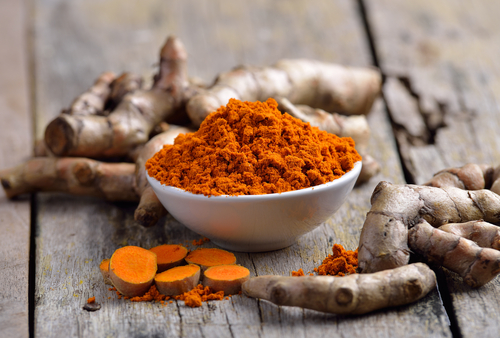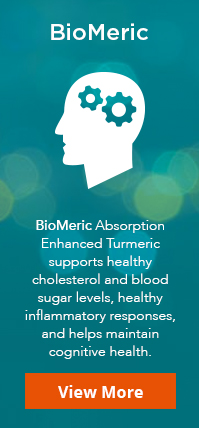Lately, it seems as if everyone has been touting the benefits of turmeric. Everyone from Dr. Weil to Dr. Oz are praising the spice. Cosmetics are getting in on the action, too, with companies like Kiehl’s offering a line of turmeric skincare products.
But what is turmeric exactly? Well, turmeric is the spice that gives curry it’s yellow color. If you’re a fan of curry and eat it often, you’re consuming healthy turmeric. The people in India have recognized turmeric for thousands of years as not just a delicious spice but a medicinal herb.
So, what makes turmeric so beneficial?
You Gotta Love Those Bioactive Compounds
While the Indians have understood the powerful medicinal properties of turmeric, Western science has only recently caught on. Compounds, called curcuminoids, the most important part of curcumin, contain powerful anti-inflammatory effects.
Inflammation is what causes all disease in the body. You name it… cancer, heart disease, diabetes, and arthritis… it is inflammation that is at the root of these diseases. Even aging is caused by inflammation. If you look years older than you actually are, you can thank inflammation for that as well.
Curcumin is such a powerful anti-inflammatory agent, it actually matches the effectiveness of some pharmaceutical anti-inflammatory drugs. Curcumin has the ability to block NF-kB, a molecule that travels into the nuclei of cells and turns on genes related to inflammation.
The bottom line is, if you want to look and feel younger and healthier, you’ve got to reduce inflammation in your body. Tumeric can help.
Tumeric Fights Free Radicals
If inflammation doesn’t get you, oxidative damage will. Another mechanism behind aging and disease, oxidative damage is caused by free radicals. But anti-oxidants protect our bodies from free radical damage.
The curcumin in turmeric just so happens to be an incredibly potent antioxidant that can stop free radicals in their tracks. But beyond this, curcumin also boosts the activity of your body’s own antioxidant enzymes. This is like a one-two punch against the harmful free radicals, and another reason why you should be getting more turmeric into your body.
Tumeric Improves Brain Function
They say you can’t teach an old dog new tricks, but this simply isn’t true. For many years it was believed that, after early childhood, neurons were no longer able to divide and multiply. But modern science has turned that belief on its head.
The truth is, in certain areas of the brain, neurons are able to multiply and increase in number. But in order to do this, the brain requires a growth hormone called Brain-Derived Neurotropic Factor, or BDNF for short. Many common brain disorders like depression and Alzheimer’s disease have been linked to decreased levels of this hormone.
Well it just so happens that the curcumin found in turmeric can increase levels of BDNF in the brain. This means supplementing with turmeric may not only help eliminate symptoms of depression, but also reverse age-related brain diseases like dementia and Alzheimer’s. It could also potentially help improve memory and make it easier for people to learn.
Tumeric Lowers Your Risk of Heart Disease
Did you know that heart disease is the leading cause of death in the world? There is a very good chance you or someone you know has been affected by heart disease.
So how does turmeric and curcumin help fight heart disease? Tumeric has an ability to improve the function of the endothelium, which is the lining of the blood vessels. Endothelial dysfunction is a major driver of heart disease and involves an inability of the endothelium to regulate blood pressure, blood clotting and various other factors.
But recent studies have found that curcumin is as powerful as exercise when it comes to improving the endothelial function. And again, curcumin fights inflammation and oxidative stress, two other contributors of heart disease.
Tumeric Can Help Prevent (And Perhaps Even Treat) Cancer
Along with heart disease, cancer is another big killer of people all over the world. Though there are many different types of cancer, they all have similar characteristics, some of which appear to be affected by curcumin supplementation.
Science has now discovered that curcumin can affect cancer growth, development and spread at the molecular level. It can also reduce the growth of new blood vessels in tumors and can contribute to the death of cancerous cells.
It’s important to mention that the curcumin content of turmeric is not very high, so if you want the full benefits, you simply won’t be able to eat enough of the spice. Best to take a turmeric supplement that contains significant amounts of curcumin.
The Key to Finding the Right Tumeric Supplement
Because of its increasing popularity, you may have noticed more and more turmeric supplements have popped up on the market. But, not every turmeric supplement was created equal.
Many of them don’t contain an ESSENTIAL ingredient. Without this ingredient, the body has a hard time absorbing all of the beneficial curcumin. The “essential” ingredient I’m talking about is called BioPerine, a black pepper extract that helps your body absorb all of that good stuff.
In other words, when you buy a turmeric supplement that doesn’t contain this ingredient, you’re wasting money AND you’re NOT receiving any of the health benefits I just listed. That’s a lose/lose.
 Validating...
Validating... 






2 Comments